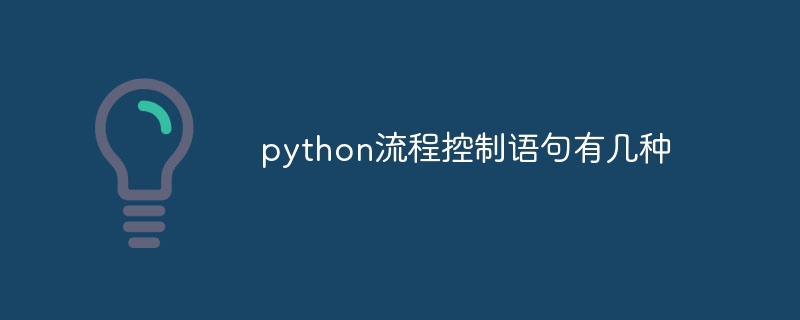Home >Backend Development >Python Tutorial >There are several types of python flow control statements
There are several types of python flow control statements
- 百草Original
- 2023-12-12 16:41:281169browse
There are three types of python flow control statements, namely conditional statements, loop statements and jump statements. Detailed introduction: 1. Conditional statements. Conditional statements are used to execute different code blocks according to the true or false condition. Python provides if statements and if-else statements to implement conditional control; 2. Loop statements, used to repeatedly execute a piece of code. block until a certain condition is met. Python provides while loops and for loops to implement loop control; 3. Jump statements are used to control the execution flow of the program, and can skip a section of code, etc.

The operating system for this tutorial: Windows 10 system, Python version 3.11.4, DELL G3 computer.
Python is a high-level programming language that is easy to learn and highly readable. In Python, flow control statements are used to control the execution order of a program. Python provides a variety of flow control statements, including conditional statements, loop statements and jump statements. This article will introduce the commonly used flow control statements in Python and explain them in detail.
1. Conditional Statements
Conditional statements are used to execute different code blocks based on the true or false conditions. Python provides if statements and if-else statements to implement conditional control.
1. if statement:
The if statement is used to execute a code block. It is executed when the condition is true and skipped when the condition is false. The syntax of the if statement is as follows:
if 条件:
执行代码块2. if-else statement:
The if-else statement is used to execute two code blocks. When the condition is true, the if code block is executed. When the condition If false, execute the else code block. The syntax of the if-else statement is as follows:
if 条件:
执行if代码块
else:
执行else代码块2. Loop statement
The loop statement is used to repeatedly execute a block of code until a certain condition is met. Python provides while loops and for loops to implement loop control.
1. While loop:
The while loop is used to repeatedly execute a block of code when the condition is true until the condition is false. The syntax of the while loop is as follows:
while 条件:
执行代码块2. for loop:
The for loop is used to traverse the elements in an iterable object, assign each element to the specified variable, and execute a section code block. The syntax of the for loop is as follows:
for 变量 in 可迭代对象:
执行代码块3. Jump statement
The jump statement is used to control the execution flow of the program. It can skip a section of code or end the loop. Python provides break and continue statements to implement jump control.
1. Break statement:
The break statement is used to terminate the current loop and jump out of the loop body. The syntax of the break statement is as follows:
while 条件:
if 条件:
break2. Continue statement:
The continue statement is used to skip the remaining part of the current loop and continue executing the next loop. The syntax of the continue statement is as follows:
while 条件:
if 条件:
continueTo sum up, the flow control statements in Python include conditional statements, loop statements and jump statements. Conditional statements are used to execute different blocks of code based on whether the condition is true or false. Loop statements are used to repeatedly execute a block of code until a certain condition is met. Jump statements are used to control the execution flow of the program. You can skip a block of code or End the cycle. Mastering these flow control statements allows us to better control the execution flow of the program and write more flexible and efficient Python programs.
The above is the detailed content of There are several types of python flow control statements. For more information, please follow other related articles on the PHP Chinese website!

